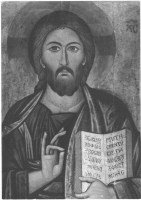The
Message
In days past, when letters were sent, it could take many days, even weeks
or months before it reached its destination. There was no e-mail or telephone
available. Not even a telegraph. And still people found ways and means
to communicate with each other.
Messages were not just sent by people via some kind of messenger to other people.
It also happened that messages were sent from God via messengers to people.
We believe that God has ‘spoken’ to communicate with mankind.
Would one not expect the designer and creator of the world to reveal who He is
and to send instructions on how to live in harmony with their Maker?
A man who claimed to have received messages from God was called a ‘prophet’.
Translated correctly, the Hebrew and Arabic word Nabi actually means
‘messenger’.
Jews, Christians, and Muslims, agree to a considerable extent on who these messengers
were. They are, among others, Noah, Abraham, Moses, Elijah, Job and David. The Jews
would deny the title ‘prophet’ to Jesus, while Muslims call Jesus ‘Nabi
Isa’. Interesting is the fact that while he is called ‘messenger’,
the actual message he brought is not recorded in the Qur’an. It is found in the
Gospel.
Strangely, Muslim teachers today allege that Jesus’ message was given to the Jews
only, yet the Qur'an mentions Jesus as being "a sign for all peoples
[beings]" (Surat 21:91).
The Qur'an teaches: "We believe in Allah, and the revelation given to us, and to Abraham,
Ismail, Isaac, Jacob ... to Moses and Jesus and that given to all prophets from their Lord.
We make no differences between one and another of them" (Surat 2:136).
To justify such contradiction to the Qur’an, Muslim teachers declare that the
Bible, which originally recorded the messages of “Abraham ... Moses and Jesus”,
is no more the Word of God, but has been changed and corrupted.
That again is not what the Qur’an teaches, when it says: "People of the
Book! ... stand fast by the Law, the Gospel and all the revelation that has come
to you from your Lord" (Surat 5:68). These words were written in the seventh
century. Many old Bible manuscripts that are still in existence today are
considerably older than that, yet they do not differ from
today’s Bibles. One would expect Muslim teachers to state when the
Bible was supposedly changed, by whom, and why; but they do not.
The Qur’an actually challenges Muslims: "If you were in doubt as to what
we have revealed unto thee, then ask those who have been reading the Book from
before thee" (Surat 10:94). Which Book? The Book given before the Qur'an.
No man can honestly claim on the basis of the Qur'an that the Bible has been
corrupted. It actually orders: "Ask those who possess the message" (Surat 21:7).
Those were the Jews and Christians.
As we already noticed, the Qur’an explicitly states that the Gospel
is the Word of God. And it also states categorically that "no man can
change the Words of Allah" (Surat 10:64 and 6:34).
Since many people have not read the Gospel for themselves, we shall present
a selection of the actual words that Jesus spoke while on earth.
They are ordered topically to make it easier to read.
Everything not printed in black is the actual message of Jesus.
| 


